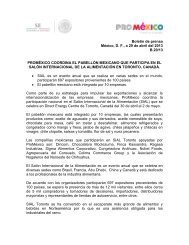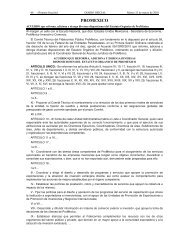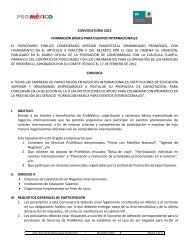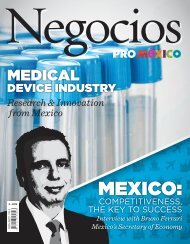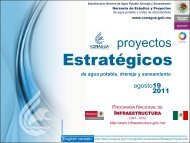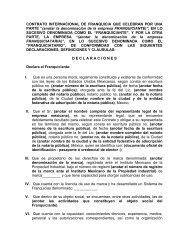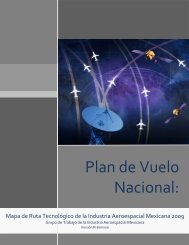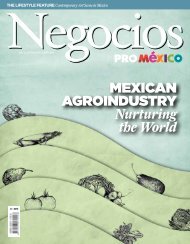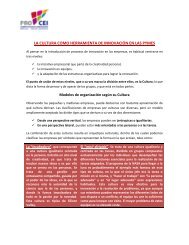MINING IN MEXICO S - ProMéxico
MINING IN MEXICO S - ProMéxico
MINING IN MEXICO S - ProMéxico
You also want an ePaper? Increase the reach of your titles
YUMPU automatically turns print PDFs into web optimized ePapers that Google loves.
the lifestyle Interview feature Editorial andreas Industry heinecke<br />
—How is an electronic book better<br />
than a printed one<br />
Printed books have a very expensive inventory<br />
problem. There is the difficulty that<br />
bookstores sell them for one or two weeks<br />
on their shelves and then they want to get<br />
rid of books to make room for new ones.<br />
A paradox occurred with this year’s Nobel<br />
Prize winner [Herta Müller]: it was unpublished<br />
for a month, even though there were<br />
translations dating from 1990 or 2000.<br />
But they were no longer available because<br />
inventories in the US are also considered a<br />
taxable asset.<br />
Another factor is the lack of piracy. The<br />
important thing about electronic books,<br />
especially those for the iPhone –the device I<br />
use most for my publications– is that a book<br />
can only be read on one iPhone. I can’t copy<br />
it for anyone else. If my wife wants to read it,<br />
I have to leave her my phone.<br />
—How are electronic books different<br />
from other media businesses, like music<br />
or film<br />
They are two separate types of media. With<br />
music you’re talking about millions [of<br />
downloads], with books, thousands. That’s<br />
the main difference and the same applies<br />
for films. My print runs vary between 2,000<br />
and 5,000 but, as opposed to bestsellers,<br />
they are known as evergreen because they<br />
are sold constantly, each month, and they<br />
don’t need to be struck off catalog lists.<br />
—What does the iPad mean for the<br />
publishing industry<br />
It’s going to be successful. They’re going to<br />
sell four million devices straight away. It’s<br />
going to attract precisely those people who<br />
are averse to reading devices because “you<br />
can’t see the pages,” “the pages turn slowly”<br />
or because “you can only read them with<br />
lights on.” If you check out Steve Jobs’ presentation<br />
you can see how you can literally<br />
lift up the page with your finger and leave it<br />
half-turned. It’s just like a book. Also, unlike<br />
a laptop, you can read it lying down rather<br />
than always having to be hunched over it.<br />
—How will it affect other reading devices<br />
I think they’re going to become obsolete.<br />
Literally. It’s completely different. Amazon<br />
is going to have to bring out a Kindle that<br />
can produce colors. I imagine they’re working<br />
hard on that right now. I think that we’ll<br />
be seeing a lot of similar devices but like in<br />
the case of the iPhone, nothing is going to<br />
get close.<br />
advantage of electronic reading will succeed.<br />
It’s a new platform. It’s a new media<br />
that may be enriched with music, hypertexts<br />
or reading clubs. It opens doors to new<br />
ways of disseminating content. For those<br />
who already own content –such as publishers–<br />
you can either choose to do nothing or<br />
add greater content and value to what you<br />
already have.<br />
—What impact will it have on the Spanish-language<br />
publishing industry<br />
I see it as an opportunity to break up monopo-<br />
“It’s a new platform. It’s a new media that may be<br />
enriched with music, hypertexts or reading clubs. It<br />
opens doors to new ways of disseminating content. For<br />
those who already own content –such as publishers– you<br />
can either choose to do nothing or add greater content<br />
and value to what you already have.”<br />
—How does this change your work as<br />
an editor<br />
Actually, I’m working with my developer on designing<br />
a platform. This is forcing me to be more<br />
ambitious and to develop my own reader for<br />
the iPad. You can create hypertexts; make books<br />
more interactive, with notes. It brings other costs<br />
down so much that I have the resources to create<br />
my own reader.<br />
The advantage of Jobs is that he lets anyone<br />
develop applications. There isn’t going to be just<br />
one platform but several. With Kindle, as an<br />
editor you upload your books and the quality is<br />
uneven. Here the editor has control, although<br />
Apple has the last word, as it won’t take on a<br />
book without testing it first. For editors like myself,<br />
this is a challenge to publish better books.<br />
—Where are publishers going to compete<br />
What is going to distinguish<br />
them from each other<br />
Content. Whoever manages to take fullest<br />
lies, as a chance for anyone with a certain<br />
amount of imagination to take part. It does<br />
away with distribution bottlenecks. For instance,<br />
the iTunes store is already selling content<br />
in Colombia, Mexico and Argentina, and<br />
not just music but also applications and content<br />
too. You don’t need to be a big publishing<br />
company any more. You can get a piece of the<br />
action if you can offer attractive content.<br />
—What entrepreneurial opportunities<br />
do you see in Mexico<br />
Mexico has enormous possibilities with<br />
technology. And not just in terms of books<br />
but for all kinds of media. We have a huge<br />
pool of talent in the software industry. Our<br />
creativeness will give us a new opportunity.<br />
If I were a businessman or considering a<br />
new business, I would set up a company to<br />
produce applications for Apple. Not just for<br />
books but all types of applications: for debt<br />
collections, for catalogs, for everything. n



